I Started Purees Too Early: Should I Stop Before Switching to BLW?
- How the guidance about when to start solids has shifted wildly over the decades...but why every major health body now advises waiting until baby is 6 months to start
- Why it's ok to use spoons in baby-led weaning but why the pre-loaded spoon method is preferred and advice on how to let baby self-feed vs. you spoon-feeding
- ...and if you're wondering whether it's harmful to stop purees and wait until baby is ready before beginning baby-led weaning, we're going to chat through that too!
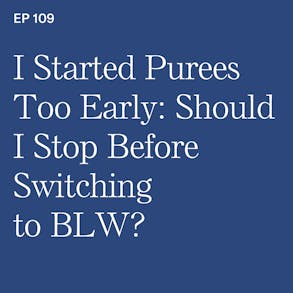
LISTEN TO THIS EPISODE
Episode Description
If you started purees and you want to switch to baby-led weaning should you stop purees? Or how do you make the transition to baby-led weaning if you began solids before 6 months of age? In this episode we’re breaking down what to do if you started solids too early and are now wondering whether you should stop before beginning baby-led weaning.
Links from this Episode
- Amy Bentley’s book Inventing Baby Food that discusses the changing age of introduction of solid foods is available on Amazon here
- Listen to the previous episode “How to Pre-Load A BLW Spoon Self-Feeding Technique with Dawn Winkelmann, MS, CCC-SLP” mentioned in this episode here
- Listen to the previous episode “The History of BLW with its Founding Philosopher Gill Rapley, PhD (Part 1)” mentioned in this episode here
- Listen to the previous episode “The Future of BLW with its Founding Philosopher Gill Rapley, PhD (Part 2)” mentioned in this episode here
- Baby-Led Weaning with Katie Ferraro program with the 100 First Foods™ Daily Meal Plan, join here: https://babyledweaning.co/program
- Baby-Led Weaning for Beginners free online workshop with 100 First Foods™ list to all attendees, register here: https://babyledweaning.co/baby-led-weaning-for-beginners

Latest Episodes
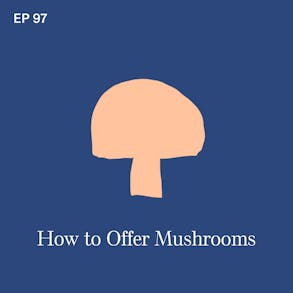
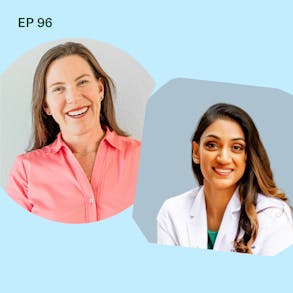
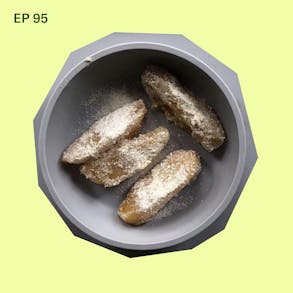
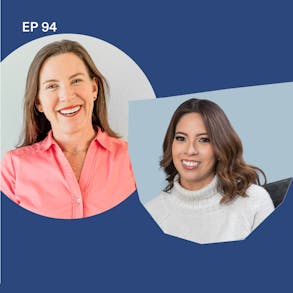

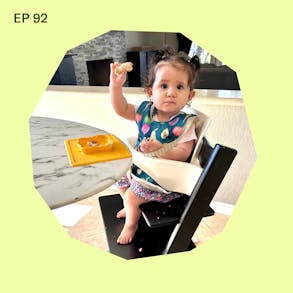
Katie Ferraro (0s):
So for people who are spoonfeeding babies purees at four months of age, just because you can push a spoonful of purees into a baby's mouth doesn't mean you should. It's not safe. Babies don't need it. Let's pump the brakes on purees. Take a pause and come back to baby led weaning. When the baby's really ready. Hey there I'm Katie Ferraro, registered dietician, college nutrition professor and mom of seven specializing in baby led weaning here on the baby led weaning made easy podcast. I help you strip out all of the noise and nonsense about feeding, leaving you with the competence and knowledge you need to give your baby a safe start to solid foods using baby led weaning.
Katie Ferraro (42s):
Well, hello there. Welcome back today. We're talking to the people who did purees a little too early. Now you might be like, what's too early. We're going to get into that. But if you started purees too early, and then you started learning about baby led weaning, should you stop the purees before switching to baby led weaning? And before we dive in, I want to share a quick story. This one's a personal story that I think will resonate with many of you. If you are feeling pressure to start solids early, I personally started solid foods with my oldest daughter, Molly, when she was four and a half months old, like I cringe hearing myself say that now I'm a registered dietician, I actually teach nutrition throughout the life cycle. I just did what my pediatrician recommended. I love my pediatrician, but he's like, ah, you start somewhere between four to six months.
Katie Ferraro (1m 24s):
Yeah, you could start now if you wanted to. And I remember feeling pressured. Well, I guess I should, because maybe she needs it. Whereas if I had really just trusted my mom-gut that she wasn't ready, she wasn't sitting up yet. I mean, I look at pictures from that week and find it in your phone, right? Based on how old your baby is. She was slumped over in the high chair. It got to the point where like she disliked eating so much and being spoonfed that I couldn't even bring myself to do what I was making my husband do it. I was like, we have to do this. She needs to be eating. And I was making all these purees, which, you know, from a nutrition standpoint, babies at four and a half months don't need anything except breast milk or formula. And so looking back, I think, gosh, how come I didn't just trust myself that my baby wasn't ready, but there's the potential out there to be pressured by outside influences, be it from grandparents or other caregivers or other mom-friends or your pediatrician.
Katie Ferraro (2m 9s):
And so the point of this episode is if you did start prior to six months of age, let's have a strategy for what you do to switch when your baby is actually ready to start. So let's look first at why people are starting purees early. What could possibly be contributing to this? Now we mentioned pressure, right? You may be hearing it from outside sources or maybe you go to the doctor and they say, oh, it's time to start solid foods. Or you have a caregiver. Who's like, no, it's I start all my babies at four months old. And this is your first baby. How are you supposed to know? There definitely is pressure out there. And I do want to point out that in individual's history or our collective history as a society plays a role in pressuring parents to do certain things too early when it comes to parenting and baby feeding is no different.
Katie Ferraro (2m 52s):
One of my favorite books is the book called Inventing Baby Food. It's by the author, Amy Bentley at a New York University. And Amy's book, inventing food is about taste health and the industrialization of the american diet. And there's this fabulous graph that she puts very early on in the book. And it's the commonly accepted age of introducing solid foods over the decades. And if you look at the decades in the 1950s and the 1960s, it was a common practice to introduce solid foods between four and six weeks of age. Okay. Think about how recent that was. And now of course, as Bentley, so nicely summarizes as scientific studies revealed the harmful effects of early solids.
Katie Ferraro (3m 32s):
The advice and the practice began to reverse with age. And now we see across the board, the World Health Organization, they recommend that infants start receiving complimentary foods at six months of age, in addition to breast milk, even the American Academy of Pediatrics, who used to say the very vague four to six months, which parents will be like, cool. Then I'll do four months. They now stress that the introduction of solid foods should occur around six months of age and to you and me like one or two months might not seem like a big deal. What's the difference four months or six months. Think about the developmental changes that will occur in your baby in a period of two months, like the difference between four to six months, like two months, that's 50% of your baby's life span at four months. Like it's actually a very big deal.
Katie Ferraro (4m 14s):
So please resist the pressure based on other people's historical experiences with solid foods to start early and know the World Health Organization, American Academy of Pediatrics, pretty much every health body out there says, wait until six months of age and know that from a nutritional standpoint, babies don't need anything besides breast milk or formula prior to the six month mark. So we hear myths sometimes. Parents will say, well, I want to do there's this trend now of flavor training. I want to introduce my baby to different flavors early on. Newsflash. Your baby is being introduced to different flavors as early as when you're pregnant with them, right? Via amniotic fluid. The flavors of the foods that you are eating are transferred to the baby.
Katie Ferraro (4m 54s):
If you're breastfeeding the compounds in the foods that you are eating in, the different flavor, profiles and tastes are transmitted through your baby's breast milk. And we know of no benefit. If you're formula feeding and babies are not getting these compounds, but you're not pregnant anymore. You're not breastfeeding. There's no benefit to introducing flavors prior to when babies need to eat solid foods. So don't feel pressured to try something trendy like this flavor training concept. It is not safe for babies to swallow anything except breast milk or formula until they are developmentally ready that occurs at or around the six month mark plus when your baby is showing the other signs of readiness to feed. And one of the most important signs of readiness to feed is your baby's ability to sit on their own relatively unassisted, right?
Katie Ferraro (5m 36s):
Because if your baby is slumping over, like, think about the anatomy that's required to facilitate a safe swallow. It doesn't occur when the baby can't sit upright. So again, hold off on starting solids until six months. If you started earlier, though, what can you do? The parents will say, well, my baby's interested in food. And I saw one of the signs of readiness to feed his babies, looking at their mom and being ready to eat food. Your baby's interested in a lot of things. And just because they're watching you eat at four months of age, doesn't mean that they are ready to eat. It's great things you can do early. You can incorporate maybe at the table, you can put them in the highchair. You can give them an open cup with formula or breast milk, a small amount of half of an ounce. I like the tiny cup from ezpz. It's designed for babies six to 12 months of age, but it's okay to start a little bit for that.
Katie Ferraro (6m 20s):
If you're doing breast milk or formula, please do not put water in the tiny cup and try to give it to your six month or your five month or four month old. The thin liquid. It's very difficult for them to swallow when they've only been accustomed to the thicker liquids of breasts or formula, but you can practice with the open cup or you can give the baby the spoon and an empty bowl and let them play around and bang with it on the high chair or pulled up to the table. When the rest of the family is eating, it's just the, it's not safe for babies to eat prior to six months of age. And of course, with spoonfeeding and traditional feeding parents start at four months all the time. You can just because you can put purees on a spoon and shove it into a baby's mouth doesn't mean that you should, babies can begin to feed themselves starting at six months of age and for talking about spoons, I've got a lot of other great content for you and episodes for you to listen about how you can do, for example, the preloaded spoon approach for baby led weaning.
Katie Ferraro (7m 11s):
If you guys go back and listen in episode 64, that's how to preload a BLW spoon. And that's with Dawn Winkleman. She's a speech language pathologist who designed the tiny spoon for ezpz. That's episode 64, great info there. Don also did another episode and this was a, in this episode, we did call purees plus baby led weaning and how the two can work in unison. Again, I'll link to these episodes. If you go to B LW podcast.com, this episode is episode one oh nine and I'll link to the other ones. In case you want to learn more about how your baby can start feeding by spoon. So if you have started with, and you want to make the switch to baby led weaning, but your baby is not yet six months of age, should you stop? My suggestion is yes.
Katie Ferraro (7m 52s):
Remember there is no benefit to introducing solid foods early. Sometimes you'll hear things like, oh, well, your baby is small, so you should start solids early so they can have catch-up weight, completely inappropriate, great recommendation. You can not use food to help babies catch up with weight when they don't know how to eat food. A recommendation for a baby who is small at four and five and six months of age, even a little bit beyond that is to fortify the breast milk or the which they efficiently know how to eat. Right? We cannot expect food to provide catch-up growth for a small baby. When a baby does not yet know how to say, sometimes you'll hear, oh, well, your baby is big. So your breast milk is not enough. Or the formula is not enough. Your baby needs solids in order to sleep through the night or in order for your baby to feel full. That is not true. Breast milk or formula is adequate to meet your baby's nutrition needs up until six months of age.
Katie Ferraro (8m 36s):
The exception being, if your child has underlying medical condition, or you have a medically fragile child in some incidences, babies may need to start early, but we tend to start with a feeding tube because it's not safe for them to swallow anything except breast milk or formula. So please remind yourself that prior to six months of age, there's no need to not to mention that it could be potentially dangerous or harmful. It is certainly safer. And trust me on this one, much more fun to feed a baby who is truly ready to start. That occurs. Usually after the six month mark, some babies will need six months plus one week until they're sitting relatively on assisted or six months plus two weeks, or sometimes even six months plus three weeks. But when you feel confident in your baby's ability to sit relatively unassisted, they're showing the other signs of readiness to feed and they're around six months of age.
Katie Ferraro (9m 21s):
That's when it's good to start with baby led weaning. And then when you do, please keep in mind Ellyn Satter's division of responsibility in feeding theory. And what Ellyn Satter says is that we have jobs in feeding and babies have jobs and feeding our job as parents. We're responsible for what the baby eats, where they eat and when they eat. But it is ultimately up to the baby to determine how much or even whether they eat. So if you're having trouble or you're stressing about your baby's not eating much, or maybe I'm starting too early step back and look at what your job is, your job is to make sure the baby is safe. So where they eat in a highchair when they eat, when they're ready, six months of age or later, and then also at prescribed mealtimes, we don't feed babies throughout the day and let them eat or graze all day long. And then what the baby eats that we're providing safe foods that are age appropriate for the baby.
Katie Ferraro (10m 6s):
Remember, it's your baby's job to determine how much or even whether they eat and in having this conversation about, should I stop? And my answer is, yes, you should stop feeding purees. You should stop putting anything in your baby's mouth. Anything placed in the baby's mouth, including a spoon can be a potential choking hazard at or around six months of age. Plus when your baby's showing other signs of readiness eat, that's when your baby can start feeding themselves. And if you need further convincing on this, I would really encourage you to go back and listen to episodes 101 and 102 with Gill Rapley. Gill Rapley is the founding philosopher of baby led weaning the quote-unquote inventor of this philosophy, the co-author of the original baby led weaning book, which many of you have read? And if you haven't, I highly suggested, and from Gill Rapley's own mouth in that interview, I just want to read a quick excerpt her quote about when we put spoons in baby's mouth.
Katie Ferraro (10m 54s):
I had asked her about her opinion and her take on spoons and his notion of moving towards allowing spoons and baby led weaning. If it's the preloaded spoon approach and what Gill Rapley said was the thing is that spoons are perfectly appropriate. I have no problem with babies using spoons themselves, but what we don't need to do is put the spoon in the baby's mouth for him. She said, that's why I love some of the spoons that are around now that are actually baby sized it's for the baby to use so much of what we understand about how babies eating develop revolves around the spoon. But there doesn't need to be this spoon. And it's true. Babies can eat such a wider variety of foods than we give them credit for.
Katie Ferraro (11m 36s):
And if you started by spoon feeding your baby with purees, that's perfectly fine, but you can stop. And what parents will ask me a lot of times of my webinars is am I doing any irreparable damage? If I stop my baby from eating purees at four months and wait until they're six months and come back with solid foods. And my answer is no, that's exactly what we should be doing. Hopefully you haven't had a choking incident, but please know when we start solids too early, the risk for choking goes through the roof because babies are not anatomically ready yet to swallow anything except breast milk or formula. So hopefully you dodged the bullet there, pump the brakes on anything except breast milk or formula. Come back when your baby is truly ready to start solid foods. And for those of you that are kind of on the cusp of whether or not your baby is ready to start solid foods, if you're looking for something you can do in the preparation phase, there's two other podcast episodes that I highly suggest you check out.
Katie Ferraro (12m 24s):
One is called Five Things Your Baby Should Be Able To Do Before Starting Baby-Led Weaning that's episode number two and episode number three, that came right after that was Five Things That Parents and Caregivers Should B Able To Do Before Starting Baby-Led Weaning. This is episode 109, and still to this day, some of the most downloaded episodes are episodes two and three, about what you should be able to do before starting and what your baby should be able to do before starting. If you started, it's okay to stop, stop with the purees. Wait until the baby is ready. I promise you you'll have such a more positive experience and certainly a much safer experience. If we wait until your baby is truly ready to start. So I'm going to link to all of the other episodes that you might be interested in. If you're at this particular phase right now, I'm going to put them on the show notes for this episode right now at blwpodcast.com/109.
Katie Ferraro (13m 9s):
And if you need one more thing to do to prepare while you're getting ready for baby led weaning or while you're waiting until that six month mark, come check out my free online workshop. It's called Baby-Led Weaning for Beginners all about how to get your baby to eat 100 foods before turning one, without you having to spoonfeed purees or buy pouches. Everybody on the workshop gets a copy of my 101st foods list. So when it is time for your baby to start solid foods with baby-led weaning, you'll never wonder what foods to feed next. I'll link to the workshop signup times for this week on the show notes page for this episode, again, that's that blwpodcast.com/109. So if you came out of the gate with a lot of energy and interest in feeding your baby purees and you started too early, it's okay to stop, continue to offer your baby breast milk or formula wait until the six month mark plus when your baby is showing this other signs of readiness to feed.
Katie Ferraro (13m 58s):
And then when you're ready to start, baby led weaning, I promise you will be such a more positive feeding experience for both you and your baby.

The Program Baby-Led Weaning with Katie Ferraro
A step-by-step digital program for starting solid foods safely and navigating the original 100 FIRST FOODS™ meal plan with baby-led weaning.
 EXPERT-LED, PROVEN APPROACH TO EATING REAL FOOD
EXPERT-LED, PROVEN APPROACH TO EATING REAL FOOD CONCISE VIDEO TRAININGS TO MASTER BABY-LED WEANING
CONCISE VIDEO TRAININGS TO MASTER BABY-LED WEANING 100 FIRST FOODS DAILY MEAL PLAN WITH FOOD PREP VIDEOS
100 FIRST FOODS DAILY MEAL PLAN WITH FOOD PREP VIDEOS
Baby-Led Weaning for Beginners Free Workshop
Is your baby ready to start solid foods, but you’re not sure where to start? Get ready to give your baby a solid foundation to a lifetime of loving real food…even if you’re feeling overwhelmed or confused about this next stage of infant feeding.
Get baby-led weaning recipes and tips delivered to your email inbox.

